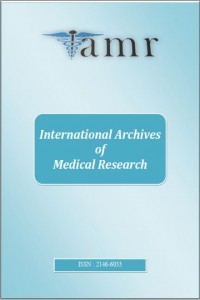The outcomes of prenatal karyotype analysis in amniocentesis and fetal blood sampling
The outcomes of prenatal karyotype analysis in amniocentesis and fetal blood sampling
Objectives: The aim of this study was to evaluate of fetal chromosome analysis in amniocentesis and fetal blood sampling cases. Method: We analysis of 649 cases between January 2007- March 2009 in Dicle University Medical Faculty Department of Genetic. The study was included 552 amniocentesis and 97 fetal blood sampling cases. Lymphocyte culture prepared in duplicate and totally ten slides were prepared for each sample. One of the ten slides was stained with direct Giemsa staining and the others were stained with Giemsa Banding Technique (GTG Banding). A total of 6490 (649x10) slides were evaluated for diagnosis. Results: A total of 649 samples were analyzed for chromosome aberrations and 267 (41%) cases had 46 XX, 257 (40 %) cases had 46, XY normal karyotype. Of the cases, 111 (17%) were detected to have abnormality. Due to cells culture failure, the outcomes of 14 (2%) cases were not obtained (10 amniocentesis and 4 fetal blood sampling). The indications of karyotype analysis were 36% with higher triple test risk, 28% with pathologic ultrasound findings, 15% with higher double test risk, 13% with advanced maternal age, 4% with familial diseases history, 2.5% with parental anxiety and 1.5% with bad obstetric anamnesis, respectively. We have no false positive and false negative results in our study. Conclusions: In our study, chromosome aberrations rate (111 (17%)) was found higher than literature, and the most indication was found higher triple tests. We suggested that karyotype analysis should be considered in all high risk patients.
Keywords:
Amniocentesis, Fetal Blood Sampling, Chromosome Aberrations,
___
- Turhan NO. Eren Ü, Seçkin N.C. Second-trimester genetic amniocentesis: 5-year experience. Arch Gynecol Obstet 2005;271: 19–21.
- Zhang L. Zhang XH. Liang MY and Ren MH. Prenatal cytogenetic diagnosis study of 2782 cases of high-risk pregnant woman. Chinese Medical Journal 2010;123(4):423-430.
- Tseng JJ. Chou MM. Lo FC et al. Detection of Chromosome Aberrations in the Second Trimester Using Genetic Amniocentesis:Experience During 1995-2004. Taiwanese J Obstet Gynecol 2006;45(1):39–41.
- Stembalska A. Slezak R. Pesz K. Gil J. Sasiadek M. Prenatal Diagnosis-principles of Diagnostic Procedures and Genetic Coumseling. Folia Histochem Cytobiol 2007;45(1):S11-6.
- Nussbaum RL. Thompson and Thompson Genetics in Medicine. Six edition, WB.Saunders Company, 2001.
- Miyake H., Nakai A. Shimada T and Takeshita T. Effect of First-trimester Ultrasound Examination for Chromosomal Aberrations in Women Undergoing Amniocentesis. J. Nippon Med Sch 2006; 72:271-276.
- Chaabouni H. Chaabouni M. Maazoul F et al. Prenatal Diagnosis of Chromosome Disorders in Tunisian Population. Anneles de Genetique 2001;44(2):99-104.
- ISSN: 2146-6033
- Yayın Aralığı: Yılda 2 Sayı
- Başlangıç: 2011
- Yayıncı: Veysi AKPOLAT
Sayıdaki Diğer Makaleler
Cystathionine synthase T833C/844ins68 Polymorphism: A family-based study on down syndromes children
Aysegul TURKYILMAZ, Selda SIMSEK, Diclehan ORAL, Selahattin TEKEŞ, Hilmi ISI
Recurrent miscarriages in a couple with t(4,8) and inv (9)
Diclehan ORAL, Ayşegül TÜRKYILMAZ, Selda SİMSEK
The outcomes of prenatal karyotype analysis in amniocentesis and fetal blood sampling
Selda SIMSEK, Aysegul TURKYILMAZ, Diclehan ORAL, Ahmet YALINKAYA, Selahattin TEKES, Hilmi ISI
